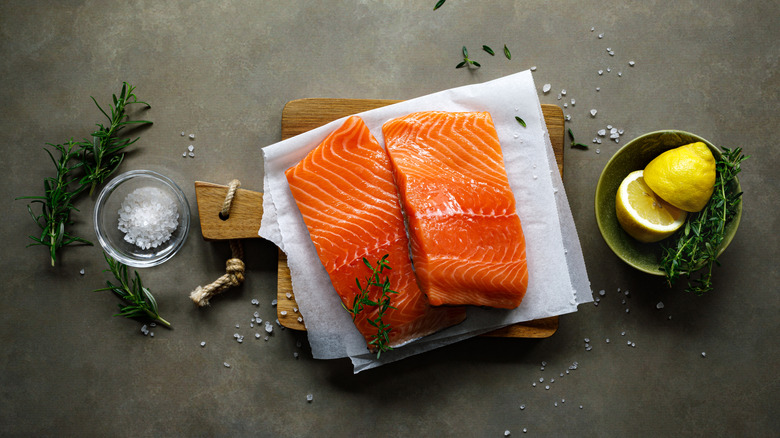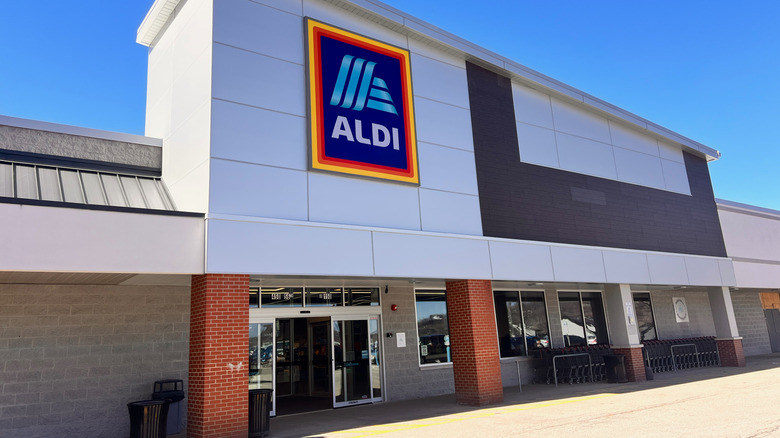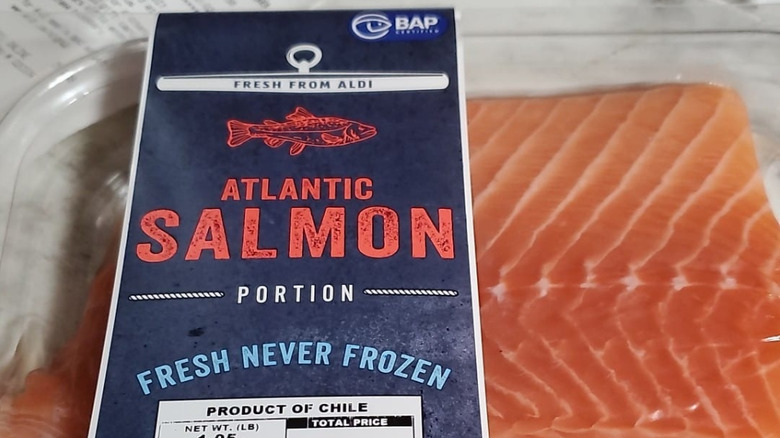The Aldi Salmon Scandal That Everyone Forgot About
Recently, Aldi found itself in hot water over something most customers probably didn't even know was an issue – the store's farmed salmon. When you check on the internet, people really seem to love Aldi's salmon and most people take food packaging at face value, especially if something is marked as a sustainable product. The upper corner of Aldi's salmon packets used to feature the words "Simple. Sustainable. Seafood." Though most customers could see no issue with this, a few advocacy groups saw things differently.
Toxin Free U.S.A. filed a complaint in 2021, accusing Aldi of misleading marketing, stating that the store's salmon reportedly came from Chilean fish farms that used unsustainable practices and toxic chemicals. Plenty of folks were drawn to the "responsibly sourced" label, thinking it meant clean water, healthy fish, and minimal environmental damage. Farmed fish can help reduce overfishing in oceans, but not all farms operate on the same ethical or environmental level. And, once customers learned more, that "simple seafood" started to look a little suspect.
What the lawsuit actually involved
Toxin Free U.S.A., along with legal representation from Richman Law and Policy, filed a full-on complaint. They claimed Aldi was misleading consumers by slapping feel-good labels on fish that didn't live up to the hype. According to the nonprofit, these weren't just any farmed fish, they were raised in conditions that included heavy chemical use and feed laced with ethoxyquin, which is not approved for use in human food in the United States but is still used in fish feed. The presence of that chemical alone was enough to make waves.
So, Aldi's marketing was hit hard as this wasn't a complaint about the fish itself but more about how the fish was sold. In a world where food labels already confuse people, putting a sustainability badge on a product with known red flags felt dishonest. The case drew attention to the gap between marketing buzzwords and actual sourcing practices. Though Aldi eventually settled and agreed to change its labeling, the damage to its reputation had already been done ... or so you'd think.
How Aldi responded and where things stand now
In response to the pressure, Aldi made some changes. The company didn't admit wrongdoing, but it did agree to adjust its marketing language to avoid future confusion. That meant walking back claims like "sustainable" and rethinking how it promoted its farmed fish. It was a quiet resolution that didn't include any massive recalls or bold press releases; it was just a simple behind-the-scenes fix that most shoppers probably didn't notice. But, for those keeping tabs on food transparency, it was a reminder of how deceptive labels can be.
Aldi's salmon still lines shelves in stores, and many customers continue to buy it without giving much thought to its origin. That's part of the problem, though — once the scandal faded from headlines, so did the pressure. There's no guarantee that sourcing practices have improved, and watchdog groups are still skeptical about farmed fish from regions like Chile. (Some customers have also said that you should think twice about buying lunch meat from Aldi due to suspiciously lengthy expiration dates.)
At the end of the day, most people want affordable seafood and assume the store has done its homework. For the highest quality, there are certain things you should look for when buying salmon, and if you care about the environment, understanding where your fish comes from should be on that list. If this situation proves anything, it's that "sustainable" isn't always as simple as it sounds.


